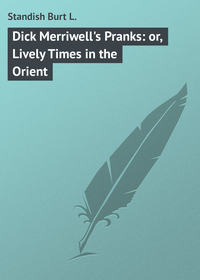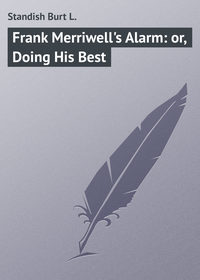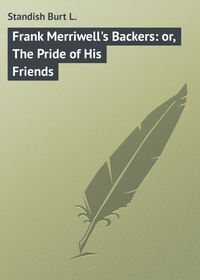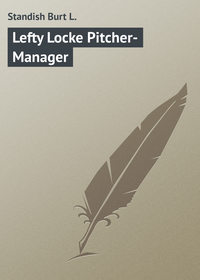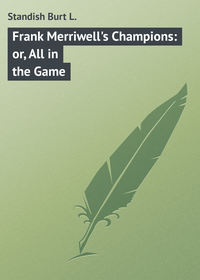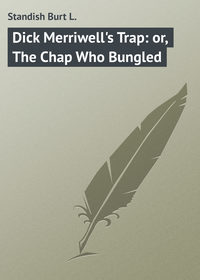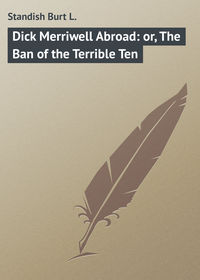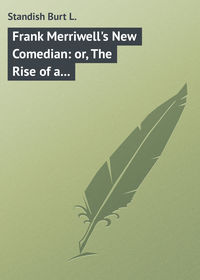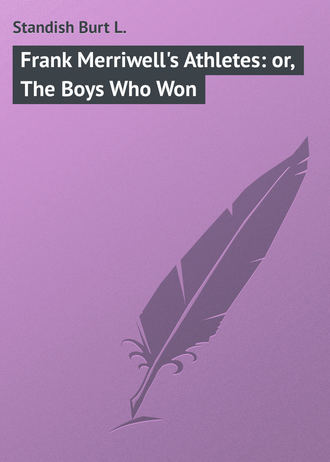 полная версия
полная версияFrank Merriwell's Athletes: or, The Boys Who Won
Not far away on a pole at least forty feet high were suspended a sheep, pieces of bread known as tortillas, and little sacks that were filled with various kinds of grain.
These were the fruits of the field, and were thus hung as a thank offering to the Sun Father, by whose grace it was possible to raise enough to supply the community.
At length the male Pueblos were seen emerging from holes in the ground, entrances to their subterranean council chambers.
Women and children, bedecked in their handsomest garments, appeared on the terraces. They wore bright robes and sheepskin leggins, the latter being white as paper.
Ordinarily these Indians wore clothes in which they could have passed muster in any civilized community, but now all who were to take part in the ceremonies appeared stripped to the breechclout, some of which were fancifully decorated and adorned.
Some of the men had worked red ribbons and skeins of yellow yarn into their long black hair, and all were painted, although, unlike Northern Indians, the Pueblos try to please in their appearance, instead of making themselves as horrible as possible.
Some were half white and some half blue, while others were marked with geometrical figures. Some were of one solid color from crown to toe.
Not a few of them were adorned with handsome white eagle feathers, and some had their heads almost entirely covered with downy feathers.
Among the Pueblos the feather is a symbol of prayer. They say the eagle soars toward the sun at will, and his soft white feathers float upward on the breeze, like thoughts.
When the eagles are breeding the Pueblos go into the mountains and capture the young, which are kept in captivity for Saint Geronimo Day.
And so it is that when the Indian decorates himself on this great occasion with fluttering feathers each feather is equivalent to a prayer that is constantly ascending to the Sun Father.
To say the least, the idea is poetical.
By the time the sun dance was ready to begin more than fifteen hundred witnesses had assembled, and more were coming.
Inza and Miss Abigail intrusted themselves to the care of the boys, who found for them a fine position to witness the celebration.
“Where is Merriwell?” asked the spinster, looking around. “I heard him talking to you in front of the tent, Inza, but I have not seen him this morning.”
“I believe he is trying to make some arrangements so that the boys may take part in the sports of the day,” answered the girl, quietly.
“Gracious!” exclaimed Miss Abigail. “What a crazy notion! I don’t understand how he can want to have anything at all to do with them horrid Indians! If the Indians were beaten at any of their games, they might get angry and kill us all.”
“Nefer you been afrait mit dot,” said Hans, who had been egged on by Barney and Ephraim to make one more attempt to win the good will of Miss Abigail. “Uf they tried dot mit you they vos sure to get left alretty queek. I vos here, und I don’d let yourself be scalped. Yaw!”
The spinster gave him a look that nearly froze him on the spot.
“You!” she exclaimed. “You would fall all over yourself trying to get out of the way if you thought there was any danger.”
“You don’d pelief me!” cried Hans. “I vos a corker to fight. Somedime ven dere vos some dangers meppy I peen aple to shown you der sort uf a heroes vot you don’d know I peen.”
This was very amusing to Barney and Ephraim, who were chuckling with satisfaction.
Frank appeared.
“It’s all right, fellows!” he exclaimed, his face glowing with satisfaction. “I have arranged it.”
“Good stuff!” exclaimed Harry. “But what are we going to do?”
“Take part in everything but the religious performances.”
“What else occurs?”
“A ball game, races, wrestling match, and so forth!”
“Hurro!” cried Barney Mulloy, in delight. “It’s shport we’ll be afther havin’ wid th’ spalpanes!”
“By gum!” grinned Ephraim Gallup. “It’s goin’ to be a sight better’n a circus!”
“I shouldn’t have been able to fix it if it hadn’t been for John Swiftwing,” confessed Frank. “He did all the business for me.”
“Is he going to take part in any of the sports?” asked Diamond.
“Yes.”
“Well, he is a dandy. He can run like a deer, and he has the strength of a grizzly bear.”
“Don’t I know it?” laughed Frank. “Didn’t I find it out when Yale played Carlisle. He was a perfect wonder among the Indians, and their entire eleven were bulldog fighters. They were not at all scientific in their play, but they gave Yale the hottest kind of a fight, and came near battering a road to victory several times.”
Inza did not seem to hear Merriwell’s words, and she was giving him no attention. She had called Hodge to her side, and was speaking to Bart.
As Frank turned toward the girl he heard her say:
“It’s a disgrace to civilization that the American Indian is treated in such a shameful manner! The Indians have been robbed, and deceived, and butchered, and lied to, till they have no confidence in white men; and now, because once in a while an Indian imitates a white man and gets drunk, it is said all Indians are bad! It makes my blood boil to think of it. John Swiftwing is a specimen of the educated Indian, and he shows what the government might do with these unfortunates if it tried. I think the United States ought to be ashamed of itself! I am ashamed of it, so there!”
Hodge laughed.
“You have grown very enthusiastic over this subject of late,” he said. “It seems to me that all your enthusiasm has been aroused since you first saw John Swiftwing.”
Inza echoed his laugh, but added color came to her cheeks.
“Perhaps you are right,” she admitted. “I confess I did not know there were any Indians like Mr. Swiftwing. He was a revelation to me.”
“There are a few like him, but he is not just what he seems, you may be sure of that, Inza.”
“Now stop right there, Bart Hodge! Don’t tell me that he is still a savage at heart. I know better! You can’t make me believe that after seeing all the fine things there are in the East and learning how much superior the method of living among white men is to the way the Indians live that a highly intelligent fellow like John Swiftwing could desire to come back here and live as his people live.”
“I shall not try to make you believe it, Inza,” smiled Bart, “for I have learned that it is not an easy thing to change your mind once you have it set on anything.”
“That’s so! When I am sure of a thing I’ll stick to it.”
Frank bit his lip.
“That’s right,” he thought. “She is the most obstinate girl in the world. She is jealous, quick-tempered, obstinate and intractable, but still there is an irresistible charm about her. I should dislike any other girl of her temperament and disposition, but it is most marvelous that the more hateful she is the greater is her attraction for me. Who can explain that? I am sure I can’t.”
He spoke to Inza, but she did not deign to give him much attention, continuing her conversation with Hodge, whose eyes twinkled as he saw there was some sort of a misunderstanding between her and Frank.
“They seem to be quarreling or making up all the time,” Bart mentally observed.
Boomp-boomp! boomp-er-boomp! boomp-er-boomp!
The sun dance had begun, and the drummer was beating out the time with a curious and ponderous drumstick.
The drum was a big rawhide affair, as large as a barrel, and was carried by two men.
The men of the two large community buildings had formed in separate groups, shoulder to shoulder, and, on an open space before the bower occupied by the images, they began the dance.
This dance was a curious lifting of the feet with a sharp, jerky motion, and they sang a Pueblo anthem, which sounded like this:
“Hi yo to hoo he yo yah hay yo,He yah hi yo ye har ye he ho.”This was a song of praise and thanksgiving to the Sun Father, and a supplication for the continuance of his favor. It was not the hoarse and discordant yelping of the Northern Indian, but arose and fell in rhythmical cadences and with an exactness of time that was surprising.
The spectators watched the dance with a curious feeling of interest and fascination.
CHAPTER XXI – THE RELIGIOUS RACE
Soon the sun dance was over and then came the religious race.
The track was a smooth strip of ground, stretching about four hundred yards from the bower in which the images had been placed.
The track was kept clear by old men, who were stationed at short distances up and down, armed with green branches to keep intruders out of the way.
At each end the contestants stood in a row, watching the track.
Each of the big community buildings was represented by sixteen runners, who were to take turns in the race.
The governor of the Pueblo made a short speech, and then, with startling suddenness two lithe figures darted out from the end nearer the bower, there was a wild shout of “hay-wah-oh,” and the race had begun.
The two runners stopped when they reached the other end of the course, but already two other runners had taken their places, darting off like foxes the moment the original two crossed a certain line that was marked by a bush that lay across the track.
This change was made at each end of the course, so all the sixteen contestants took turns.
But it was permissible to put the same runner in as many times as necessary, and it so happened that, whenever one side would get a lead over the other, the best runners were called on to go in repeatedly.
Behind each of the runners chosen to take up the race next stood two old men, who were each holding a long eagle feather. With these feathers they repeatedly touched the calves of the runners’ legs, at the same time muttering a prayer to the Sun Father, imploring him to give the runners the speed of the eagle.
The spectators showed much excitement as the race continued.
“Um-o-pah! um-o-pah!” they shouted, wildly waving their hands to the winners.
They were urging them to “hurry up.”
In vain the boys looked for John Swiftwing.
“It’s strange he has not been chosen to take part in this race,” said Frank. “I have been told by one of the old chiefs that he was swifter than all their other runners before he went away to school.”
“Are there no other races?” asked Hodge.
“Yes; but this being the religious race, is of the most consequence, and usually the best runners are put into this.”
“Perhaps Swiftwing is saving himself for some other race.”
“Perhaps so.”
Inza watched the runners with great interest, but Miss Abigail soon tired of the affair.
“I can’t say that I see anything entertaining or intellectual in all this,” she sniffed.
“Yaw,” nodded Hans, who still kept near her; “I peen feexed dot vay yourself. Der race vas on der pum. You agree mit yourself about dot exactly.”
“Don’t bother to agree with me about anything!” came stiffly from the spinster. “I don’t care to have you agree with me.”
“Oh, you don’d! Vell, you reminds me uf a feller vot I knowed vonce on a time. He vas alvays disagreeing mit eferydings. He wouldn’t eat anyding vot he thought might agree mit him, und so he died der disbepsia of. You vant to look out for dot.”
With this shot Hans edged away, not liking the glare Miss Abigail gave him.
“You pet me my life she don’d got der pest uf me all der times!” he chuckled.
While the religious race was taking place, Swiftwing suddenly appeared at Frank’s side.
“If you wish to play ball,” he said, “you may have a chance. Bring your friends. Come.”
Frank spoke to the boys, all of whom, with the exception of Browning, were eager for the sport.
Bruce grumbled a little, but followed Frank.
Swiftwing led them away, but he had found time to speak a word in Inza Burrage’s ear, and Frank had noted this.
Merry saw Inza start a little and then shake her head, while her face grew pale and she pressed nearer to her aunt.
“I wonder what the fellow said to her,” thought Frank, who was far from pleased. “She would not tell me if I asked her, so I’ll have to continue to wonder.”
The young Indian led the boys to a place not far from the bower, but beyond the crowd of spectators.
“The ball game will be for sport,” he said, “and, as you do not know just how Indians play ball, I have decided that you shall be divided. Four of you will play on one side, and five on the other. The rest of the players will be Indians, and there will be twenty on a side. They are preparing now. Get ready, for the game will begin right after the race.”
So, with much joking among themselves, the boys pulled off their sweaters and prepared for the race.
Swiftwing gave their superfluous clothes into the care of an old man, who was told to watch carefully that no Mexicans or Apaches stole anything from him.
Then Swiftwing showed the boys the balls and the bats, which were like old-fashioned “shinny” sticks, and explained to them how the game was to be played.
This done, the Indian youth left Frank to divide his party, and hurried away.
Within three minutes a great shouting announced that the religious race was over, and one of the buildings had won over the other.
Barely had this shouting ceased when, with yells like wild animals, thirty-one young bucks, stripped to the breechcloth, came from somewhere and rushed upon the white boys.
Hans gave a gurgle of fear and rolled over in a sudden attempt to take flight.
“Here vas where you lose mein scalp!” he gurgled.
Toots was scared, and his teeth chattered.
“Oh, Lordy!” he gasped. “Mah wool am gone dis time fo’ suah! I done knowed I’d nebber keep dis wool on mah haid till I got back home!”
Barney Mulloy squared off, his hands clinched and his eyes flashing.
“Come on, ye spalpanes!” he grated. “It’s a roight tough bit av a shcrap we’ll be afther havin’, me laddy-bucks!”
“Gug-gug-good gosh!” stammered Ephraim Gallup, his face turning pale and his knees knocking together. “We’re ketched in a trap, by gum! I wish I was to hum on the farm!”
“What’s the meaning of this, Merriwell?” cried Jack Diamond, clutching Frank’s arm with a strong grip. “Are we in for scalping – or what?”
“It’s all right,” assured Merriwell. “That’s their way of attracting the attention of the crowd and informing them that the ball game is about to begin.”
“Is that all?” gurgled Ephraim, in great relief, seeing the young Indians gather about but observing they did not offer hostilities. “Wal, darned if I ain’t afraid I’ll never be able to comb my hair ag’in! It feels as if it was stickin’ up stiffer than quills on the back of a hedgehoag.”
The shout from the young bucks had attracted the attention of the spectators and they were rushing toward the spot.
A hand touched Frank’s arm.
“Come,” said the voice of John Swiftwing. “A place for us to play will be prepared.”
John was one of the young bucks. He had cast aside the clothes of civilization, and, like the others, he was stripped to the breechcloth.
His physique was magnificent, and Frank regarded him with admiration. Such broad shoulders, such a deep chest, such hard and muscular limbs were not common among the Pueblos.
In Swiftwing’s hair eagle feathers had been fastened, and it seemed that, with his clothes, he had cast aside all the refining changes of civilization.
He was a savage again!
His eyes were flashing, and his head was poised proudly on his strong neck. The players looked to him as a leader, and they followed him to the cleared space where the ball game was to take place.
Frank had divided his party. Rattleton, Diamond, Mulloy and Gallup were on one side, while Merriwell, Browning, Hodge, Dunnerwust and Toots were on the other.
It took but a few moments for all arrangements to be completed.
The sides of twenty men each were drawn up facing each other, with an open space between them. The forty players were scattered over considerable territory. Each man stood in an expectant attitude, one of the rude bats in his hands, ready for the ball to be put into play.
The ball was small and hard, and the players could not touch it with their hands after play began, but they must keep it constantly in the air. The moment it touched the ground the game was won and the side upon whose territory it had fallen were defeated.
This was the usual rule, but, on this occasion it was modified somewhat, as there were white players in the game, and it was not expected they could do as well as the Indians who were familiar with the sport. It was decided that the ball must be driven to the ground twice on one side or the other in order to insure a defeat. It was to be the “best two out of three.”
Suddenly there was a shrill yell, a sharp crack, and the ball had been batted into play.
CHAPTER XXII – THE BALL GAME
Up, up into the air sailed the little ball.
With a shout the players rushed to get beneath it.
Frank found himself on the side opposite Swiftwing.
John was the first to strike the ball after it had been batted into play.
Down came the little black sphere, and, poising himself on one foot, the Carlisle “buck” swung his bat and sent the ball straight toward Frank.
The trick was done with marvelous skill, and it seemed to be a challenge.
Frank squared himself in a fraction of a second, and then —
Crack!
Back sped the ball.
A whoop of delight went up from Frank’s side.
“Shimminy Gristmas!” cried Hans. “Don’d dot peen a pird! Gif id to him, Vrankie!”
Crack!
Swiftwing hit the ball, and, with equal skill, he shot it back at Merriwell.
Frank was expecting this, and he returned it with all the skill of a professional tennis player.
The spectators roared their applause.
For some moments this “volleying” was kept up, and then the ball glanced from Swiftwing’s bat and went high in the air.
Frank had come out best in this first struggle, much to his surprise, as, not being familiar with the game, he had not anticipated such success.
The white men in the crowd gave a yell of delight.
Frank caught a glimpse of Inza’s face, and he fancied there was an expression of disappointment on it.
“I believe she would have been pleased if he had vanquished me!” thought Frank, a trifle bitterly. “I do not understand her at all of late.”
He could discern the look of admiration on the girl’s face as she regarded the magnificent Indian who commanded the players on the side that opposed Merriwell.
Frank was somewhat dismayed when he discovered that Whirling Bear was the commander of his side.
The young Indian who had been drunk at Embudo the day before was straight enough now, and he seemed to be somewhat of a favorite among the Pueblo athletes.
Not a few of the Indians showed a strong dislike for John Swiftwing, and Frank understood this was because he had been away to the white man’s school. They wished to see him beaten at everything that he might know how weak he had become while he was learning the white man’s knowledge.
When the ball glanced from Swiftwing’s bat it was not allowed to fall to the ground. A lithe savage ran under it and sent it spinning into the air.
Far over Whirling Bear’s side sped the little black sphere.
Whirling Bear shouted a command.
Like a flash three of the rearmost bucks darted after the ball, and one of them, who had the speed of the wind, ran under it as it was falling to the ground. Without stopping or pausing, he swung his bat and hit the ball.
Oh, what a shout of delight pealed from white men and Indians alike! Surely the ball had been kept from the ground in a most amazing manner, for the batter was not able to stop and turn till he had passed at least forty feet beyond the point where he hit the ball.
There was a rush on Swiftwing’s side, and the ball was returned.
The one who struck it sent it straight at Hodge.
Bart met it with a good crack and sent it back.
Barney Mulloy poised his bat.
“Begobs! Oi’ll knock the paling off it wid me shtick!” he cried.
With all his might he struck.
And missed it!
But one of the young Indians was on hand, and he seemed prepared for such an emergency, as he struck the ball before it could reach the ground, lifting it into the air again, and saving the first defeat for Swiftwing’s side.
Hans Dunnerwust saw the ball coming in his direction, and he resolved to get some glory out of the game.
He ran to meet it, tripped himself, fell down, rolled over, sat up, and swung his bat. In some manner he succeeded in hitting the ball as he sat on the ground, and he sent it into the air again.
“You don’d done dot mit me!” he cried, and the spectators roared and cheered, the white men laughing loudly, and not a few of the Indians betraying mirth.
“Gol darn my punkins!” exclaimed Ephraim Gallup, joyously. “This is more fun than a darg-fight! Never see nothing like it before! Let me git a rap at that ball!”
But when he made a run for it, his long legs got tangled with his bat, and he was tripped with such suddenness that he flipped into the air as if sent with a spring, turned over and dropped on the back of his neck.
An Indian struck the ball, however, and it did not touch the ground.
“Say!” snorted the Vermonter, as he sat up and glared around, “p’int me aout the critter what done that!”
No one paid any attention to him, so he got up, secured his bat, and waited for a chance to get at the ball without running after it.
Crack! crack! crack! – the bats were rapping the little ball in quick succession, and the players and spectators were feverish with excitement.
The Indians were betting madly on the outcome of the game, and the white witnesses were taking “chances” on it.
Dan Carver, cool and serene, was covering everything that came his way, backing Swiftwing’s side.
Frank was watching an opportunity to get in a good “drive.” He observed that the most of the Indian players knocked the ball into the air, and he fancied that a drive that would place it might be successful.
His opportunity came at last.
He gave the ball a fierce crack, sending it shooting over the heads of the other side, just out of the reach of their bats.
It dropped in a clear space, before a player could reach it, and a great shout of victory went up.
Whirling Bear, although the commander of the side that Frank was on, had said nothing to Merriwell, and he seemed to show signs of disgust, as if he were not pleased that it should have been a white lad who had knocked the ball.
Dan Carver did not seem at all disturbed by what had happened, but continued to take bets, offering to place any sum on Swiftwing at one or two.
In a moment the game was resumed, and it went forward with more intensity than before. The players seemed warmed up to the work, and their skill in keeping the ball in the air was astonishing, to say the least.
Several of the white players won some glory.
Both Diamond and Rattleton got in good strokes, and Bruce Browning struck once with all the power in his muscular arms, sending the ball so high into the air that it was a mere speck and almost went out of sight.
“Begorra! it’s not such fun as this Oi’ve had since Oi attinded me larst Oirish fair!” cried Barney, who was in his element. “This b’ates a wake!”
“It’s a darn sight more fun than shuckin’ corn at a huskin’-bee!” grinned Ephraim Gallup. “Take that, gol darn ye!”
He managed to hit the ball at last, after missing it three times, and nearly turning himself wrong side out with the violence of his efforts.
“Whee!” he squealed, as the little sphere carromed off his bat and whizzed into the air. “I bet a squash that started the bark on her!”
Toots got a crack on the shins that upset him and made him howl with pain.
“Land ob wartermillions!” he wailed. “Nebber see no such mess as dis am! Dutchmans an’ Irish all mixed up in a stew! An’ ebry one ob um seems tryin’ teh git a crack at de nigger’s shins wif dem sticks! I’s gwan teh retellyate on some pussen bimer-by – yes, sar!”
Once Harry Rattleton was able to save Swiftwing’s side from a second and final defeat. An Indian struck and missed the ball, but Harry caught it with his bat, having struck almost at the same instant.
“Gear she hoes – I mean here she goes!” he yelled. “Can’t do it again over there! We’re going to do you up, after all!”


